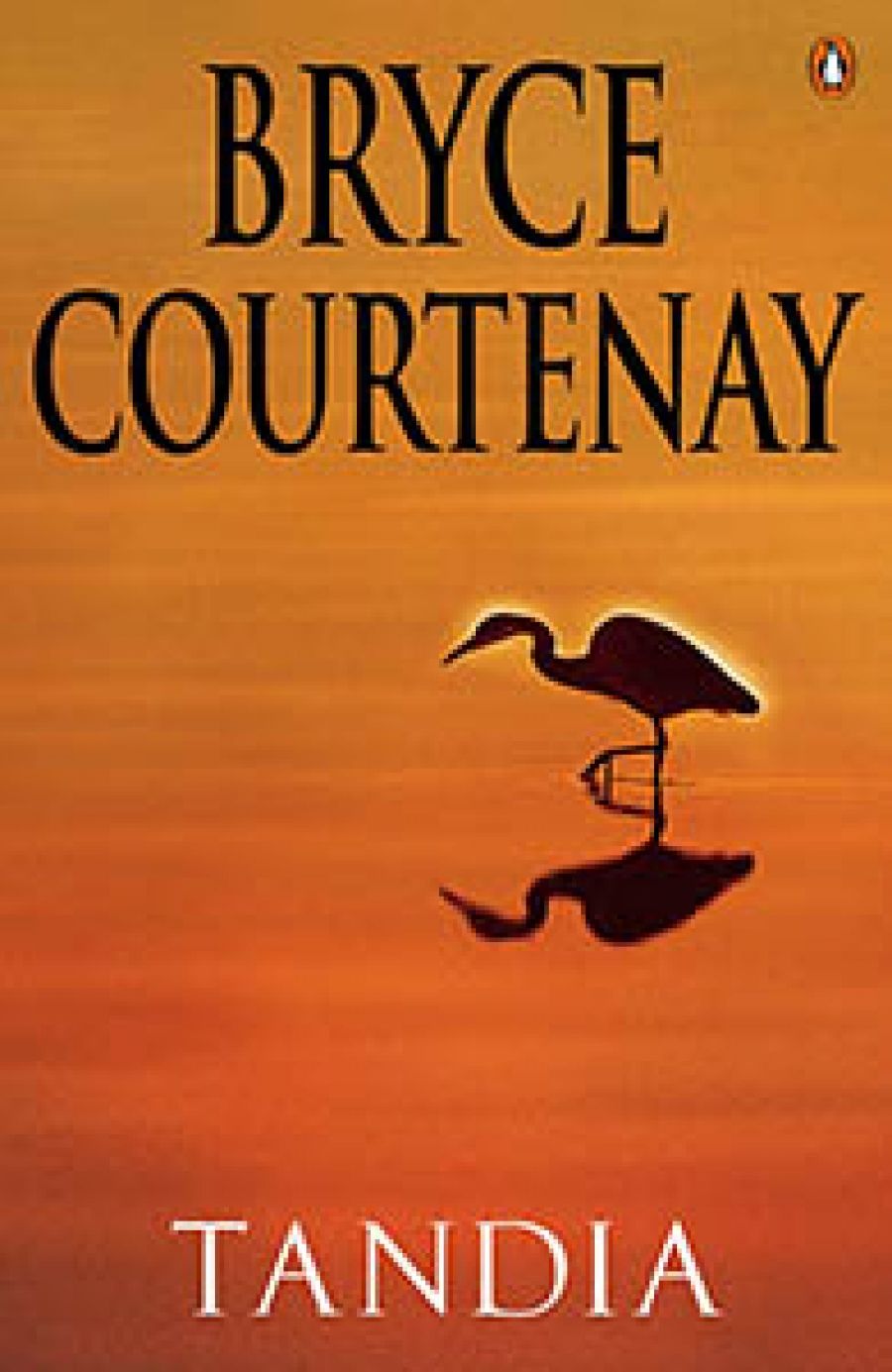
- Free Article: No
- Contents Category: Fiction
- Review Article: Yes
- Article Title: Over the top
- Article Subtitle: Politics, social authenticity, and melodrama in the style of 'Gone With the Wind'
- Online Only: No
- Custom Highlight Text:
After all the acrimony and gossip generated by the success of Bryce Courtenay, it is surprising to discover that the advertising director and newspaper columnist is a talented writer.
- Book 1 Title: Tandia
- Book 1 Biblio: WHA, 900 pp, $34.95 hb
She warmed to the dusty-ankled, bright-eyed ragamuffins who’d run behind the car, yelling and cheering their progress. Some rolled hoops made from the spokeless rim of a bicycle wheel, guiding them with short sticks held onto the grooved rim; others pushing skeletal motor cars shaped entirely out of bits of wire and driven by long sticks, each attached to a small wire steering wheel with which the driver turned the wheels. Catapults dangled around the necks of the kids, bouncing on their chests as they ran.
This reveals the liberal sensibility at its most powerful – one which acknowledges the complexity and messiness of human interaction and the necessary limitations of any political structure we might devise for organising it. And it is here that Courtenay’s difficulties as a novelist and a political commentator arise, for he is tempted to comment too much – and to have his characters proselytise too blatantly – on what is an already fully realised picture.
The attempt to mesh the complexities of the grand narrative with the simplifications of the thirty-second grab is as awkward as the attempt to explain the vast structure of the South African state in terms of individualist motivations of hatred and fear (a view which overlooks the economic planning that lies behind nationalism, for example). Although there may be a connection between the political scheme and the personal motive, the distance between the two is too great to be leapt by a single narrative voice – no matter how omniscient or garrulous that voice may be. Rather than allowing for complexity, the tone becomes merely portentous, particularly through the repetition of the epigraph, ‘Together since the world began, the madman and the lover’, which – if anything – actually counts against the possibilities for change, and offers an insufficient axis upon which to balance the huge political erection that is apartheid.
As a grand novel, then, Tandia is powerful but not entirely convincing, veering as it does between an attachment to authenticity of experience and over-the-top melodrama. (Over-the-top is literally where the heroine, hero and villain go, in their various ways, in the final moments of the novel.)
Nine hundred pages is a lot of space for any author to justify. To the extent to which Courtenay is creating a popular, cinematographic picture of a politically mythic space, narrative elbow room probably is needed; and the popularisation of apartheid as an issue and the ‘heroinisation’ of a coloured South African woman are laudable achievements politically. I occasionally felt that I was reading a newly wrought Gone With the Wind – another narrative which combines politics, social authenticity, and melodrama, and which seems even to have provided a certain Deep South flavour to its South African offspring. But this is a particularly hard narrative trick to pull off, and one which Margaret Mitchell in Gone with The Wind achieves through concentrating on the love interest at the expense of realism.
The problems in Tandia are reminiscent of the structural difficulties which arise in nineteenth-century Australian romances. Rosa Praed’s work, which is both politically informed, theosophically committed and shows deep fascination for the details of feminine subjectivity, provides a particularly close model. All this, of course, places the poor narrative under a huge strain, and credibility of plot is often the first to topple. Praed’s Sister Sorrow and Fugitive Ann provide the clearest examples.
Despite this, perhaps because of it, an overwhelming sense of desire is evoked in this kind of novel – both Courtenay’s and Praed’s. It is a desire which, in being situated in a ‘new’ world (in popular fictional terms), provides great scope for pushing against political, individual, and even narrative boundaries. It is an awkward generic mixture, however, because its attachment to social realism means that it has less scope for narrative experimentation than, say, metafiction or Coetzee’s anomic laments. Instead, experimentation resides in the characters themselves – the limits they are prepared to ignore for the sake of their quest, rather than the limits the narrator is prepared to ignore for the sake of establishing a new ontological perspective. The fault-line is psychological rather than metaphysical.
But then if Peter Carey can deservedly win the Booker Prize for rewriting the nineteenth-century narrative of origin, I don’t see why Courtenay should be begrudged his one million or so readers across seventeen countries for upholding the, in some ways more difficult and exhilarating, Victorian romance.


Comments powered by CComment